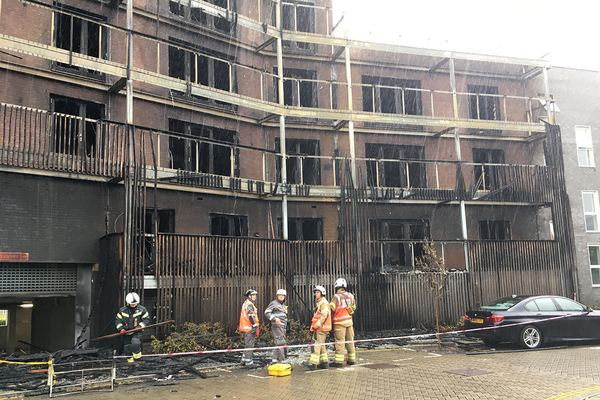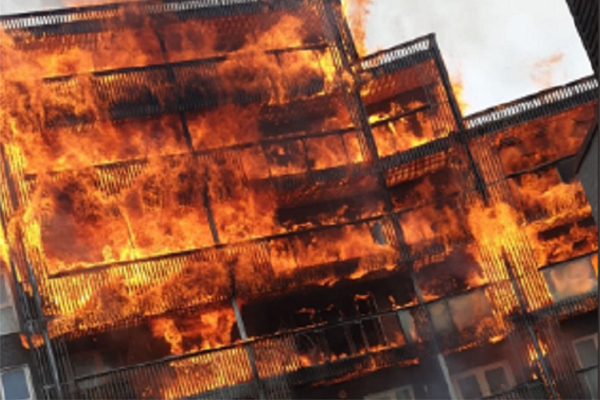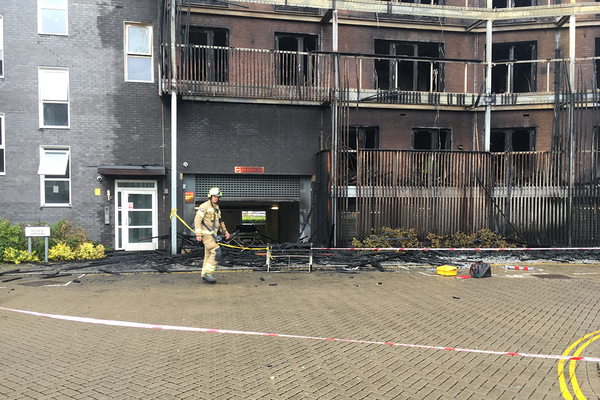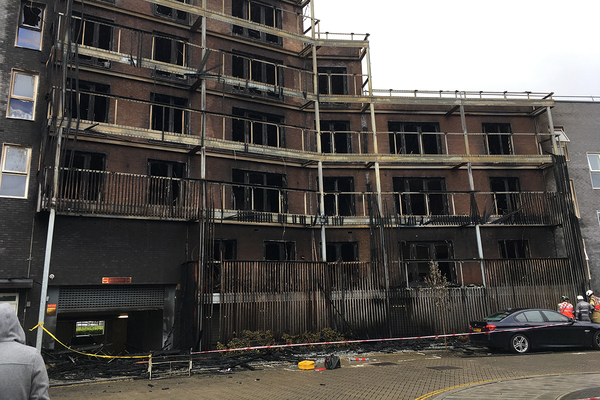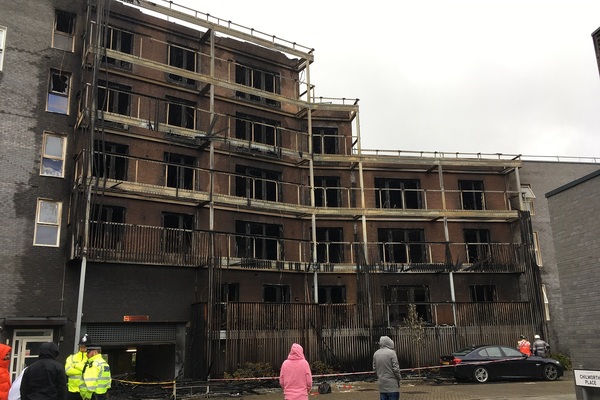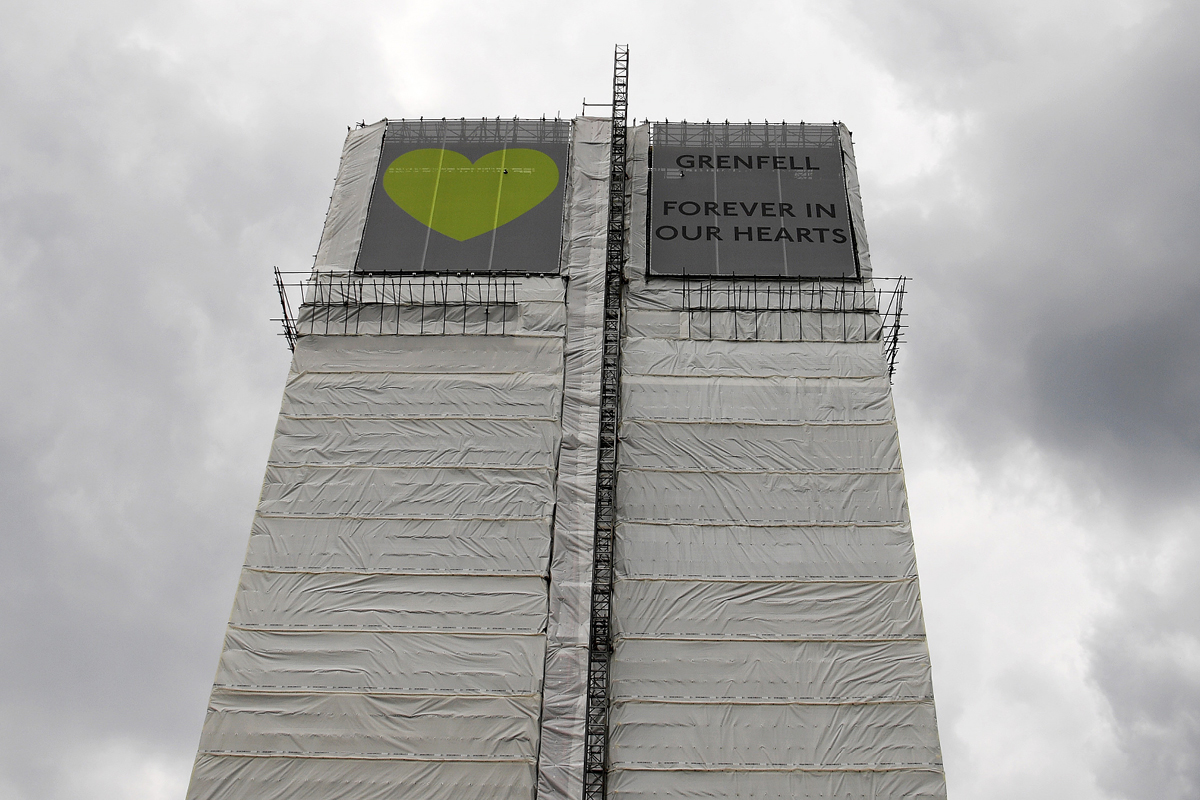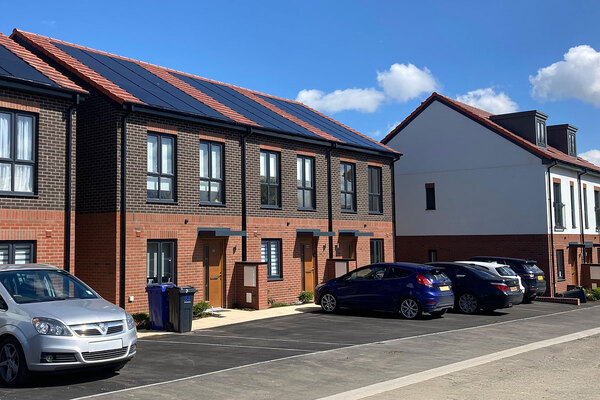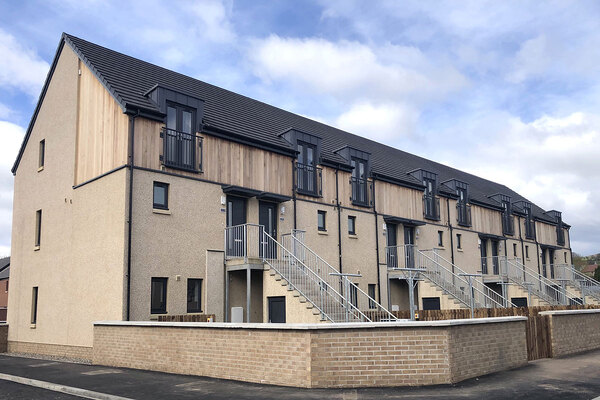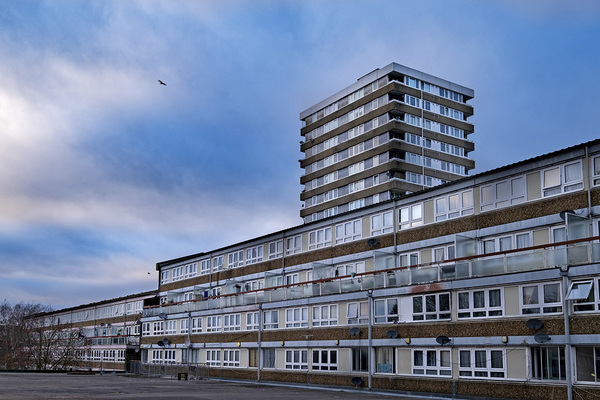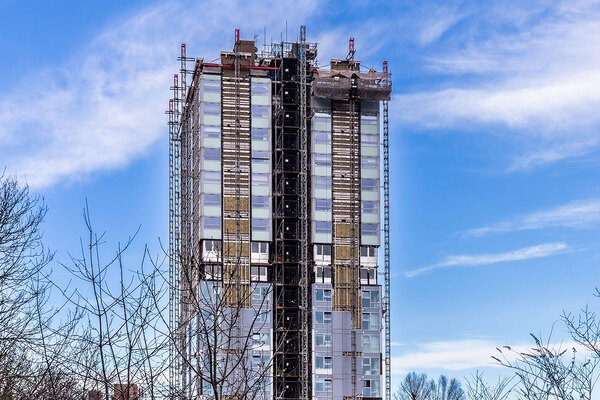You are viewing 1 of your 1 free articles
Barking fire residents ‘had to break through doors’ in desperate bid to escape flames
Residents of the Barking block involved in a huge fire last weekend have said they had to break through doors in a desperate bid to escape the rapidly spreading flames.
At a public meeting last night attended by residents and the block’s developer Bellway, one resident described how those near the top of six-storey Samuel Garside House were almost trapped by the fire.
The resident, who lives in a block nearby and entered the building to alert residents about the fire, claimed that the alarm had been on silent at the time of the fire, and that those living inside the block were able to escape only because they were alerted by neighbours.
He told the meeting that some of the building’s magnetic doors had not released, meaning residents had to break them open.
“Some residents were not aware that there was a fire until… smoke had reached inside the building. At the top of the building it was very, very hot and very, very smoky and people had to break through the magnetic doors to get out because the fire alarm didn’t go off,” he said.
At the meeting:
- Residents questioned Bellway’s claim that the timber cladding on the balconies could withstand fire for 30 minutes
- The developer suggested that its current plan is to treat wood on other buildings in the development to make them more fire resistant
- Residents passed a motion calling for the timber to be fully removed across the site
- Bellway said that eight of the damaged homes will take six months to make ready for re-habitation
Residents asked why Bellway believed that the wooden cladding on the outside of the building could take heat and flame for up to 30 minutes despite Sunday’s fire spreading across the building in less than six minutes.
“We have all been told by Bellway that the cladding was not fire retardant and it was protected to take the heat and flame for about 30 minutes. If that is the case, how come after four or five minutes the first fire crew were there and the whole place was an inferno? That’s not 30 minutes, is it?” he said.
Ian Gorst, regional chair for London and South East at Bellway, said that while the timber cladding “was not fire rated”, the structure and the fabric of the building in all respects “performed exactly as it was designed to do”.
He said: “Clearly the images which are extremely distressing and the speed with which the fire took across the decorative timber across the balconies is clearly unacceptable and something we need to address.”
Inside Housing revealed on Monday that the wood used on the block was a Class D-rated material called ThermoWood. Government guidance requires Class B for the external surfaces of walls on buildings above 18m and limited combustibility, or A2, for insulation. Class D is more combustible than both of these. Samuel Garside House is below 18m.
Mr Gorst said timber was used because of the timing of the initial design of the block 10 years ago, when “the trend in architecture was to use sustainable and natural products”.
Inside Housing also reported this week that the architect on the development was Sheppard Robson. The firm has so far declined to comment.
The comments were made at a meeting last night between residents of Samuel Garside House, developer Bellway, management company RMG, ground rent company HomeGround, and Barking Riverside – the joint venture between L&Q and the Greater London Authority that owns the whole of the Barking Riverside development.
As part of the meeting, Barking Reach Residents’ Association brought forward three resolutions including calls for Bellway to remove cladding from all apartment buildings and houses across the Barking Riverside development.
Mr Gorst said that Bellway intended to remove the cladding from Samuel Garside House, and that it was currently looking at proposals to treat the wood on the houses across the development to provide them with greater fire resistance.
Residents recalled stories from the day of the fire, as well as the impact it has had since Sunday.
Investigations into the cause of the fire are ongoing, and Mr Gorst said that Bellway was carrying out its own review of the building.
Mr Gorst said that as of Monday there were a total of 47 flats that had been fire damaged: 27 suffered no damage inside, 12 suffered minor smoke damage and eight suffered fire damage.
He added that the 27 flats would be ready within four weeks, the 12 with minor damage would be ready in eight weeks, and it would take six months for the eight damaged flats to be fit for habitation.
Grenfell: two years on
Picture: Rex Features
We have published a number of articles to mark the second anniversary of the Grenfell Tower fire on 14 June:
How politicians missed the chance to stop Grenfell: A special investigation looking into the government’s failure to act on the warnings from the fatal Lakanal House fire in 2009 in time to prevent the Grenfell tragedy.
Listen here to an audio version of the article:
Barking fire shows many fire safety gaps remain two years after Grenfell: This week the second anniversary of the Grenfell Tower tragedy was marked by fire destroying another block of flats. This is why it is time to step up efforts to improve fire safety, writes Martin Hilditch.
Grenfell’s forgotten victims: life on the Lancaster West after the fire Residents of the flats surrounding Grenfell Tower have been through a housing crisis like no other – many diagnosed with PTSD as a result. Luke Barratt hears some of their stories.
Have the promises made after Grenfell been kept?: After the Grenfell Tower fire, people in power made a number of pledges. But two years on from the tragedy, have they been true to their word? Peter Apps finds out.
Grenfell management company ignored Lakanal recommendations after government said they would not be mandatory: A previously unreleased report shows that Kensington and Chelsea Tenant Management Organisation ignored advice from the Lakanal House fire coroner after Department for Communities and Local Government officials said they would “not become mandatory”.
Barking fire makes the urgent need for action only too clear: The horrific fire in Barking on Sunday is a reminder that there is much to do when it comes to residents’ safety, writes Jules Birch.
We got the Grenfell rehousing process wrong and it is time to apologies to survivors:
The rush to hit arbitrary deadlines in the rehousing process put pressure on survivors, when pressure was the last thing they needed. It’s time to say sorry, again, writes Kim Taylor-Smith, deputy leader of Kensington and Chelsea Council.
